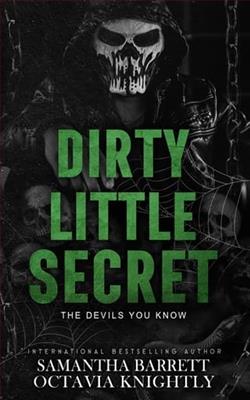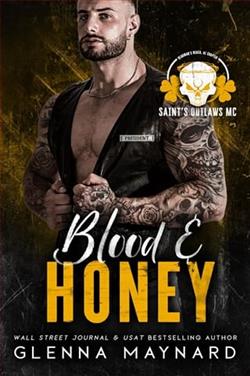Page 27 of The Burning Wire (Lincoln Rhyme 9)
"Blood pressure was high. Spiking."
"And now it's not high, Thom, is it?" Lincoln Rhyme said testily. "It's nice and normal. That's sort of like saying the Russians sent missiles to Cuba. That was tense for a while. But since Miami isn't a radioactive crater, I guess that problem sorted itself out, now, didn't it? It's. In. The. Past. Call Pulaski, call the techs from Queens. I want the evidence."
His aide ignored him and said to Sachs, "Didn't need medicine. But I'm keeping an eye on it."
She gave Rhyme another visual examination. Then said she was going upstairs to change.
"There a problem?" asked Lon Sellitto, who'd arrived from downtown a few minutes before. "Aren't you feeling good, Linc?"
"Oh, Jesus Christ," Rhyme spat out. "Is everybody deaf? Is everybody ignoring me? . . ." Then he glanced into the doorway. "Ah, at last. Another country heard from. Goddamn, Pulaski, at least you're being productive. What do we have?"
The young cop, back in uniform, was carting in milk crates that the crime scene officers usually used for transporting evidence bags.
A moment later two techs from the Queens Crime Scene HQ brought in a bulky plastic-wrapped object: the wire. The strangest weapon Rhyme had ever seen in a case. And one of the deadliest. They also had the access door from the substation basement, similarly wrapped in plastic.
"Pulaski? The coffee shop?"
"You were right. I've got some things here, sir."
A lifted eyebrow from the criminalist reminded the officer the appellation wasn't necessary. The criminalist was a retired captain of the NYPD. He didn't have any more right to a formal title or "sir" than anybody else on the street. And he'd been trying to break Pulaski of his wispy insecurities--they were due to youth, of course, but there was more to it: He'd sustained a serious head injury on the first case they'd worked together. It had nearly ended his career in law enforcement, but he'd stayed on the force, despite the injury and the resulting bouts of confusion and disorientation that occasionally still plagued him. (His determination to remain a cop had been inspired largely by Rhyme's decision to do the same.)
In furthering his cause to make Pulaski a top crime scene officer, one of the most important things Rhyme needed to instill was a bulletproof ego. You could have all the skills in the world but they were useless if you didn't have the balls to back them up. Before he died, he wanted to see Pulaski move up high in the ranks of Crime Scene in New York City. He knew it could happen. He had a brief image of a hope of his: Pulaski and Sachs running the unit together. Rhyme's legacy.
He thanked the CS technicians as they left with respectful nods and expressions that suggested they were memorizing what the lab looked like. Not many people made it over here from headquarters to see Rhyme in person. He occupied a special place in the hierarchy of the NYPD; there had been a recent turnover and the head of forensics had gone to Miami-Dade County. Several senior detectives were now running the operation until a permanent head could be appointed. There was even some talk of hiring Rhyme back to run Crime Scene once more.
When the deputy commissioner had called about this, Rhyme had pointed out that he might have a few problems with the JST--the NYPD job standard test portion of the requirements. The physical fitness exam required candidates to complete a timed obstacle course: sprint to a six-foot-high barrier and jump over it, restrain a fake bad guy, race up stairs, drag a 176-pound mannequin to safety and pull the trigger of a weapon sixteen times with one's dominant hand, fifteen with the other.
Rhyme demurred, explaining to the NYPD official who came to see him that he could never pass the test. He could probably clear only a five-foot barrier. But he was flattered by the interest.
Sachs returned downstairs, wearing jeans and a light blue sweater, tucked in, her hair washed and lightly damp, pulled back into a ponytail once more, bound with a black rubber band.
At that moment Thom went to answer the doorbell and another figure stepped into the doorway.
The slim man, whose retiring demeanor suggested he was a middle-aged accountant or shoe salesman, was Mel Cooper, in Rhyme's opinion one of the best forensic lab people in the country. With degrees in math, physics and organic chemistry, and a senior official in both the International Association for Identification and International Association of Blood Pattern Analysis, he was constantly in demand at Crime Scene headquarters. But, since Rhyme was responsible for kidnapping the tech from a job in upstate New York years ago and getting him to the NYPD, it was understood that Cooper would drop what he was doing and head to Manhattan if Rhyme and Sellitto were running a case and they wanted him.
"Mel, glad you were available."
"Hm. Available . . . Didn't you call my lieutenant and threaten him with all sorts of terrible things if he didn't release me from the Hanover-Sterns case?"
"I did it for you, Mel. You were being wasted on insider trading."
"And I thank you for the reprieve."
Cooper nodded a greeting to those in the room, knuckled his Harry Potter glasses up on his nose and walked across the lab to the examination table on silent, brown Hush Puppies shoes. Though by appearances the least athletic man Rhyme had ever seen, apart from himself, of course, Mel Cooper nonetheless moved with the grace of a soccer player, and Rhyme was reminded that he was a champion ballroom dancer.
"Let's hear the details," Rhyme said, turning to Sachs.
She flipped through her notes and explained what the power company field executive had told her.
"Algonquin Consolidated Power provides electricity--they call it 'juice'--for most of the area. Pennsylvania, New York, Connecticut, New Jersey."
"That's the smokestacks on the East River?"
"That's right," she said to Cooper. "Their headquarters is there and they have a steam and electricity generation plant. Now, what the Algonquin supervisor said was that the UNSUB could've broken into the substation at any time in the last thirty-six hours to rig the wire. The substations are generally unmanned. A little after eleven this morning he, or they, got into the Algonquin computers, kept shutting down substations around the area and rerouted all that electricity through the substation on Fifty-seven. When voltage builds up to a certain point, it has to complete a circuit. You can't stop it. It either jumps to another wire or to something that's grounded. Normally the circuit breakers in the substation would pop but the perp had reset them to take ten times the load, so it was sitting in that"--she pointed to the cable--"waiting to burst. Like a dam. The pressure built up and the juice had to go someplace."
She picked up an evidence bag containing teardrop-shaped bits of metal. "And then it blew," she repeated. "These were all over the place. Like shrapnel."
"What are they?" Sellitto asked.















